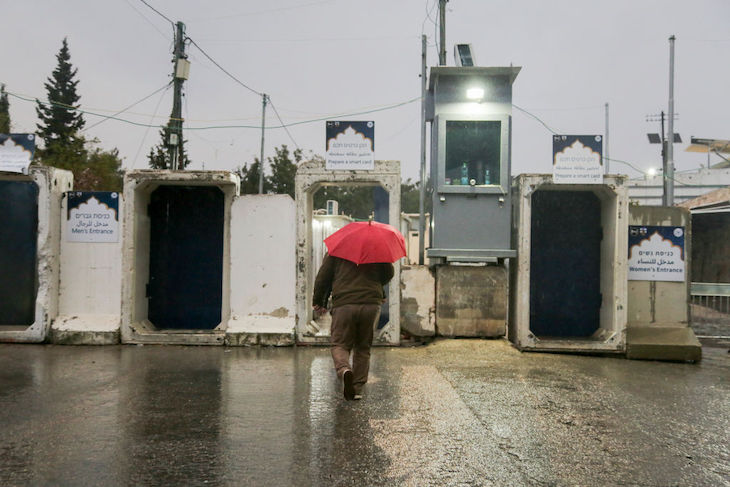War seldom has true victors – and for Bethlehem, where tourism once accounted for approximately 70 per cent of income, the Israel-Gaza conflict has left businesses shuttered and livelihoods in ruins. Since the October 7 attack, my home country of Australia’s Department of Foreign Affairs has classified Bethlehem and the rest of the West Bank under its highest Level 4: “Do Not Travel” risk advisory. Earlier this month – despite my better judgement – I ventured into Bethlehem to witness firsthand the impact of the Israel-Gaza war on the city’s economy and dwindling Christian population.
‘There are dozens of hotels in Bethlehem, and they’re almost all empty.’
Under the Oslo Accords, Bethlehem was designated as part of Area A of the West Bank, meaning the Palestinian Authority has full civil and security control over the region. Israeli citizens are prohibited from entering without special permission, and the Israel Defence Forces rarely operate there. Area A comprises just 18 per cent of the West Bank’s landmass, though most Palestinian cities fall within it.
After some haggling, Charlie, my East Jerusalem taxi driver – who proudly noted that he shared a name with the King of England – agreed to take me in. His optimism was reassuring. ‘The war is over, we have a ceasefire. It’s all back to normal, I promise you’
Crossing into Area A quickly painted a different picture. The Israeli checkpoint was heavily armed, while the Palestinian side was deserted. ‘The cameras scan every licence plate. They’ll come quickly if you’re not supposed to be here,’ Charlie explained.
Bethlehem’s first landmark was a towering, ten-storey car park. In normal times, it would hold more than 50 tourist buses. That day, there was just one.
At the Church of the Nativity, one of the world’s oldest churches, the city’s desolation became even clearer. In peacetime, the site welcomes 15,000 visitors a day, with a three-hour wait to enter. That afternoon, I had it to myself.
‘You’re the first foreigner I’ve had in ten days – thank you so much,’ my guide, Ahmed, told me. Unlike Charlie, he held no optimism, only a quiet desperation.
‘I’m a Muslim, but I spent seven years in Bible school. Almost all of the 400 Christian guides have left,’ he said. ‘This city used to be 80 per cent Christian and 20 per cent Muslim, but now it’s more than flipped’.

‘There are dozens of hotels in Bethlehem, and they’re almost all empty. We barely survived Covid, and now we have the war. Tourists won’t come here’.
According to Bethlehem’s Mayor Anton Salman, unemployment now sits at 50 per cent, 20 per cent higher than the rest of the West Bank. For those that can, there is no choice but to leave to seek work permits in Israel.
As we entered the church, a Palestinian Authority policeman asked for my nationality and religion. ‘Australian, Christian,’ I replied.
Unemployment in Bethlehem is 50 per cent, 20 per cent higher than the rest of the West Bank
He took a photo of me and waved me through. ‘Don’t worry, it’s just for the tourism statistics,’ Ahmed assured me.
Within the Church of the Nativity complex sit some of Christianity’s holiest sites: the Grotto of the Nativity, the Manger and the Church of Saint Catherine – a 19th-century Catholic church where Christmas Midnight Mass is held. Seeing them in total solitude was profoundly unsettling.
Outside, Charlie was waiting. ‘Your taxi driver has abandoned you in this very dangerous city,’ he joked to me. ‘I told you it was safe. There’s nobody here’.
We walked through the Old City’s empty cobblestone streets, passing hundreds of boarded up gift shops, restaurants and bars.
‘Are they closed because of Ramadan?’ I asked.
‘No, this has nothing to do with Ramadan,’ Charlie replied. ‘Most of the owners are Christian, and they’ve all left Bethlehem’.
Eventually, we arrived at an open shop and restaurant. I was ushered upstairs and given a steaming bowl of soup and the best falafel shawarma imaginable. The shop owner, Joseph, came over, pleading with me to buy souvenirs.
‘Our government does nothing to help us. We are desperate in Bethlehem. We rely on people like you to survive. Please, take whatever you want, but just be generous. Know that you’re helping a community far greater than yourself’.
He urged me to share Bethlehem’s plight with my friends back home. A chessboard and several fridge magnets in hand, Charlie and I headed to the Milk Grotto, another deeply significant Christian site. That day, its doors were locked, its gates shut.
Charlie honked his horn. No one answered.
‘You can’t have everything, William’.
We returned to Jerusalem just in time for sunset. I watched as Muslims made their way to Al-Aqsa Mosque for evening prayers, while a group of Jewish children and their parents gathered to celebrate Purim, flanked by ten Israeli soldiers. The Holy Land remains as divided as ever.
Later that evening, over a drink at the historic King David Hotel – the site of the 1946 bombing of the British Mandate administration – I asked a senior Israeli government official what he thought of my day in Bethlehem.
‘That wasn’t very bright’.
Perhaps. But this Easter, as I return home, I’ll be grateful for the chance to have met Charlie, Ahmed, Joseph and the others still holding on in Bethlehem.






Comments